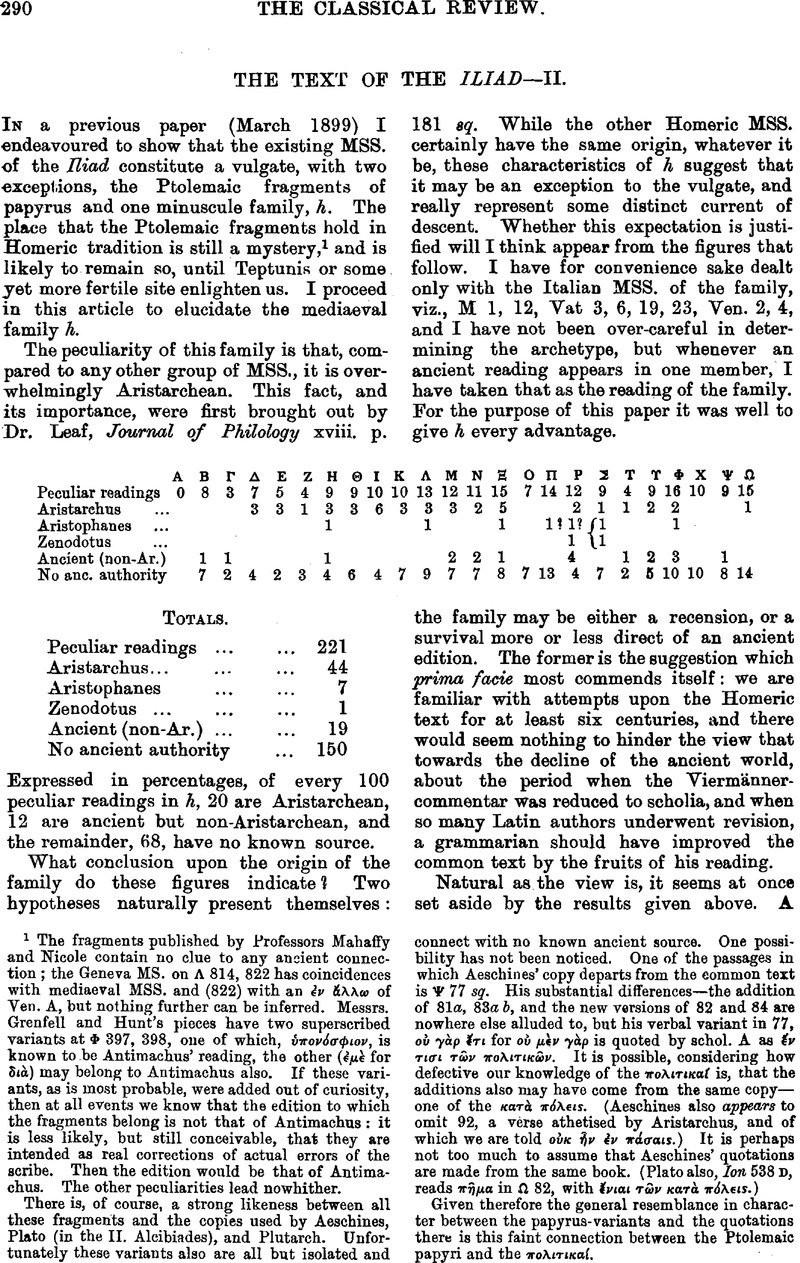No CrossRef data available.
Article contents
The Text of the Iliad—II
Published online by Cambridge University Press: 27 October 2009
Abstract

- Type
- Original Contributions
- Information
- Copyright
- Copyright © The Classical Association 1900
References
page 290 note 1 The fragments published by Professors Mahaffy and Nicole contain no clue to any ancient connection; the Geneva MS. on Λ 814, 822 has coincidences with mediaeval MSS. and (822) with an ⋯ν ἄλλω of Ven. A, but nothing further can be inferred. Messrs. Grenfell and Hunt's pieces have two superscribed variants at Φ 397, 398, one of which, ὑπ∘óσφι∘ν, is known to be Antimachus' reading, the other (⋯μ⋯ for δι⋯) may belong to Antimachus also. If these variants, as is most probable, were added out of curiosity, then at all events we know that the edition to which the fragments belong is not that of Antimachus: it is less likely, but still conceivable, that they are intended as real corrections of actual errors of the scribe. Then the edition would be that of Antimachus. The other peculiarities lead nowhither.
There is, of course, a strong likeness between all these fragments and the copies used by Aeschines, Plato (in the II. Alcibiades), and Plutarch. Unfortunately these variants also are all but isolated and connect with no known ancient source. One possibility has not been noticed. One of the passages in which Aeschines' copy departs from the common text is Ψ; 77 sq. His substantial differences—the addition of 81a, 83a b, and the new versions of 82 and 84 are nowhere else alluded to, but his verbal variant in 77, ∘ὐ γ⋯ρἔτι for ∘ὐ μ⋯ν γ⋯ρ is quoted by schol. A as ![]() . It is possible, considering how defective our knowledge of the πολιτικα⋯ is, that the additions also may have come from the same copy—one of the κατ⋯ π⋯λεις. (Aeschines also appears to omit 92, a verse athetised by Aristarchus, and of which we are told ∘ὐκ ἦν π⋯σαις.) It is perhaps not too much to assume that Aeschines' quotations are made from the same book. (Plato also, Ion 538 D, reads π⋯μα in Ω 82, with
. It is possible, considering how defective our knowledge of the πολιτικα⋯ is, that the additions also may have come from the same copy—one of the κατ⋯ π⋯λεις. (Aeschines also appears to omit 92, a verse athetised by Aristarchus, and of which we are told ∘ὐκ ἦν π⋯σαις.) It is perhaps not too much to assume that Aeschines' quotations are made from the same book. (Plato also, Ion 538 D, reads π⋯μα in Ω 82, with ![]() .)
.)
Given therefore the general resemblance in character between the papyrus-variants and the quotations there is this faint connection between the Ptolemaic papyri and the πολιτικα⋯.


